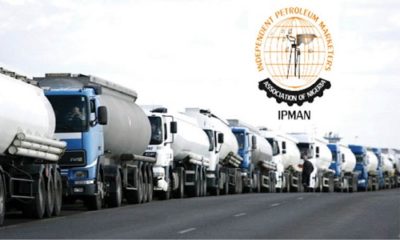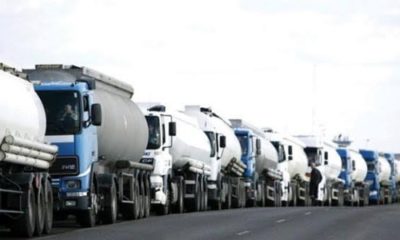Oil
Exchange, rising interest rates gives marketers fuel importation concern as scarcity bites harder

LAGOS-THE lingering fuel scarcity in major cities and towns across Nigeria has continued to bite harder in the day two of intensive long queues and search for fuel in petrol/ gas stations nationwide even as the high exchange and interest rate has been fingered for being responsible for the oil marketers low interest in oil importation.
 Entrances to many filling stations in Lagos and other parts of the country remained shut to motorists on Sunday following a sharp drop in the supply of petrol to the market even as those selling on Monday (today) were besieged with massive queues.
Entrances to many filling stations in Lagos and other parts of the country remained shut to motorists on Sunday following a sharp drop in the supply of petrol to the market even as those selling on Monday (today) were besieged with massive queues.
This development is coming on the heels of revelations that oil marketers were no longer interested in importing the product mainly because of the rising exchange rate of the dollar to the Naira.
The other factors responsible for the marketers’ action are delayed subsidy payments and rising interests on loans from banks.
An official of a major marketing firm, who declined to have his name in print, said, “I am afraid that we cannot continue to import petrol because it costs more now to do so owing to the recent devaluation of the Naira. The rising amount of petrol subsidy arrears payable to us coupled with the high interests on loans from financial institutions, are still major issues in our hands.”
Another marketer told one of our correspondents that an exchange rate of N226 per dollar was demanded on import duties contrary to the inter-bank exchange rate of N198 posted on the website of the Petroleum Products Pricing Regulatory Agency for the pricing template of PMS approved on February 19, 2015.
The major marketers import close to 60 per cent of petrol consumed in the country while the Nigerian National Petroleum Corporation imports the balance.
Our correspondents observed on Sunday that the states hit badly by scarcity of petrol were Lagos, Ogun, Oyo, Bayelsa, Ondo, Ekiti, Kaduna, Delta, Plateau, Akwa-Ibom. Abuja, the nation’s capital, appeared to be the worst hit by the shortage.
The Chairman, Nigeria Union of Petroleum and Natural Gas Workers, Lagos Zone, Alhaji Tokunbo Korodo, said the depots did not have enough products to serve filling stations across the country.
“If there were enough to go round, tanker drivers, of course, would move products to the areas of need. Nigerians should not be surprised that this is happening now. It is really unfortunate,” he said.
In Lagos, many filling stations did not sell petrol but those that were open for business had long queues of motorists to contend with.
Although their pump prices remained N87 per litre, black market operators sold 10 litres for N1,200, i.e N120 per litre.
Drivers of commercial buses capitalised on the situation to increase their fares. For instance, fare for Ojodu-Berger to Magboro, which hitherto was N50, was N100 on Sunday.
One motorist told one of our correspondents in Lagos that, “If our fuel finishes now, we will go and queue to get another fuel. Now that we have fuel, passengers would have to pay more until the situation improves.
It was a Herculean task for motorists in Sango-Ota, Ijebu Ode and Abeokuta in Ogun State to purchase petrol from the stations.
Although most of the stations sold petrol at the regulated price of N87 per litre, the Oando Filling Station in Ijoko, Ota sold it for N100.
A motorist, who bought from the said station demanded for and was issued a receipt which she forwarded to one of our correspondents.
In Ibadan, Oyo State, one of our correspondents had learnt on Friday that the scarcity was due to unsubstantiated information that petrol price would go down to N65 per litre.
A manager at one of the stations in the Mokola area of the city, said the rumour seemed to be gaining ground and that the marketers were studying the situation.
He said, “No businessman wants to run at a loss. The product we have now was purchased at the old price. We have not added any price to the stipulated N87 per litre of petrol but the queue is long because many people are not sure of the availability of the product in a few day’s time or why some fuel stations are not selling.
“Those who are not selling must have exhausted their product and are unwilling to buy more at the old price because of the fear that the rumour of a new price of N65 per litre could be true. If we buy today at the current price and government slashes price tomorrow, who pays for the deficit?”
The situation was the same in Ado Ekiti, Ekiti State on Sunday as many filling stations rationed the product.
A station along Adebayo Road which on Saturday sold the product for only two hours in the evening and did not on Sunday.
Motorists and commercial transport operators went to the hinterland where petrol sold at a higher price but readily available. The price ranged between N100 and N105 per litre.
The shortage which was noticeable in Warri, Sapele, Ughelli and other parts of Delta State thinned out on Sunday.
But the pump price of the product remained high in Asaba as motorists paid between N95 and N100 per litre.
The attendants said the directive to sell at prices higher than N87 was given by their bosses, who they said claimed to have bought the product at a higher price .
The scarcity in Ondo State which began on Thursday worsened on Sunday. Petrol also sold for between N95 and N110 per litre in filling stations that were operational.
Checks by our correspondent in the state showed that most of the stations were still locked .
The Chairman, Independent Marketers Branch, Nigeria Union of Petroleum and Natural Gas Workers, Ore, Mr. Olakunle Ajulo, attributed the scarcity to the failure of government to pay subsidy claims.
He expressed hope that the matter would soon be resolved as stakeholders were already tackling the issue.
Ajulo blamed the shortage in Ondo and Ekiti states on the fact that the Ore Depot was not functioning.
There was also scarcity in Yenagoa, Bayelsa State. Apart from a few filling stations and the NNPC mega filling stations, others did not sell the product.
The product also sold for between N110 and N120 per litre in Jos, Bukuru and its environs in Plateau State.
An attendant at one of the stations, who identified herself as Yeni, said, “We have product, but the manager asked us to lock up the station.”
Many filling stations in Uyo, Akwa Ibom on Sunday were selling petrol at N110 per litre as against N140 to N150 per litre which was prevalent price for a litre of fuel last week.
Motorists and commuters in Kaduna State continued to groan in pain in the wake of fuel scarcity that hit the metropolis and its environs since Friday.
The Group General Manager, Group Public Affairs Division of the NNPC, Ohi Alegbe, told our correspondent on the telephone that the Federal Government had injected fresh 680 million litres of petrol to boost the product supply base.
He said the effect of the injection which was done at the weekend would be felt from Monday(today) even if nothing was felt at the level of monitoring earlier tod.
He advised Nigerians to desist from panic buying of petrol because there was no need for such.
Meanwhile, the Presidential Campaign of the All Progressives Congress has said that the return of queues at filling stations is a confirmation that the policies of the Goodluck Jonathan administration are founded on deceit and insincerity.
According to the APC campaign, it is now evident that the recent reduction in cost of petrol was borne out of political expediency, rather than compassion.
It also condemned the poor electricity supply across the country by power firms, describing it as a sad reminder of the failure of the PDP-led Federal Government.
The group, in a statement by its Director of Media and Publicity, Mallam Garba Shehu, wondered how a political party which has been in power for 16 years, could still feel confident to seek another term in office.
The statement partly read,“The issue is that being unable to set up even one new refinery in the past five years and unable to get existing refineries to function up to 50 per cent capacity, the people of Nigeria surely need another set of people to be in charge of affairs.
Oil
NNPC Discovers Over 4,800 Illegal Pipeline Connections

The Nigerian National Petroleum Company (NNPC) Limited has revealed the detection of more than 4,800 unauthorized connections on oil pipelines within the country, painting a troubling image of the nation’s primary source of revenue.
Mele Kyari, the Group Chief Executive Officer of NNPC Ltd, communicated this information to the Senate Committee on Appropriations last Friday.
He said, “We have over 4,800 illegal connections on our pipelines. That means in some lines, within 100 kilometres of pipelines, you have as much as 300 insertions.
“Therefore, even when you produce the oil, you cannot deliver them at the required pressure and therefore the volume will also be less.”
As per the NNPC Ltd chief, individuals from various regions enter the Niger Delta, inserting unauthorized connections on pipelines in Nigeria’s oil-producing area.
This recent revelation follows a prior discovery of 295 illegal connections to the pipelines by the firm a year ago, underscoring the escalating issue of crude oil theft in Nigeria.
Two years earlier, Kyari had highlighted the country’s daily loss of 200,000 barrels of oil, amounting to $13 million due to theft and vandalism.
He further stated “We have two sets of losses, one coming from our products and the other coming from crude oil. In terms of crude losses, it is still going on. On the average, we are losing 200,000 barrels of crude every day.”
After the discovery, Nigeria’s security forces pledged to enhance security around the country’s pipelines.
To bolster this, the Federal Government granted a multi-billion naira pipelines surveillance contract to Tantita Security Services, headed by former militant leader Government Ekpemepulo, also known as Tompolo.
Despite facing criticism for this decision, Senator Heineken Lokpobiri, the Minister of State for Petroleum, remains convinced that it was the appropriate course of action.
In August, following a tour of oil facilities in the Niger Delta, Senator Heineken Lokpobiri expressed gratitude to Tantita, commissioned by NNPC Ltd, for their ongoing work.
He also hinted at plans for further extensive endeavors in the future.
In 2021, after extensive debate and delays, the Petroleum Industry Bill was finally passed to attract increased foreign investment into the oil sector through amendments to regulations, royalties, and taxes.
Oil
Dangote Refinery Set To Begin Fuel Production With First Crude Arrival

Nigeria’s colossal $19 billion Dangote Refinery, after encountering several setbacks, is on the verge of kickstarting fuel production.
This achievement is heralded by the arrival of the first crude shipment, transported by the OTIS tanker carrying 950,000 barrels of Nigeria’s Agbami crude.
S&P Global, citing industry sources and tanker tracking data on spglobal.com, reported the tanker’s departure on December 6, en route to Lekki, the nearest land port to Dangote’s offshore crude receiving terminal.
Scheduled to reach its destination around 8 PM on December 7, the arrival of this shipment signifies the commencement of crude supplies for the refinery’s operations.
Chartered by the state-owned Nigerian National Petroleum Company (NNPC), the Suezmax tanker is an emblem of the initial crude supply to Dangote’s cutting-edge refinery, as disclosed by a West African oil trader familiar with the matter in the S&P report.
Even though the refinery was officially completed in May, the absence of domestic crude feedstock had hindered oil product manufacturing.
To address this, the NNPC, holding a 20% stake in the refinery, struck an agreement to provide 6 million barrels of crude oil as feedstock to the Dangote refinery in December.
This move aims to jumpstart operations and overcome the previous impediments.
Agbami, operated by Chevron, holds a prominent position among Nigeria’s major deepwater developments, producing around 100,000 barrels per day in the central Niger Delta.
Known for its light sweet crude qualities, with a specific gravity of 47.9 API and a low sulfur content of 0.04%, Agbami produces substantial amounts of naphtha and kerosene.
NNPC has chartered additional shipments from different Nigerian offshore fields to the refinery, marking the start of a sequence of planned crude supplies for the month, as mentioned by the oil trader.
Located on the outskirts of Lagos, Nigeria’s commercial hub, the Dangote Refinery encountered repeated delays since its 2013 announcement, despite significant installation progress in 2019.
The refinery, designed to handle multiple crudes simultaneously, targets three Nigerian crude grades—Escravos, Bonny Light, and Forcados. When operating at full capacity, it aims to produce 327,000 barrels per day (b/d) of gasoline, 244,000 b/d of gasoil/diesel, 56,000 b/d of jet fuel/kerosene, and 290,000 metric tons per year of propane/LPG.
Dangote’s operations starting signify Nigeria’s hopes to lessen its reliance on gasoline imports, addressing the deficiencies of its existing refineries undergoing repairs. This shift is poised to reshape Nigeria’s oil industry, potentially leading to gasoline self-sufficiency by the 2040s.
Dangote officials anticipate an initial output of 370,000 barrels per day (b/d), emphasizing jet fuel and diesel production.
Industry analysts, however, project the refinery to reach its full operational capacity by mid-2025, although potential delays remain a looming concern.
Oil
NNPCL Sets Dec 2024 Terminal Date For Fuel Importation

The Nigerian National Petroleum Company Limited (NNPCL) has announced intentions to cease importing refined petroleum products by December 2024, anticipating full operational functionality for all national refineries by that time.
Group CEO, NNPC Ltd, Mele Kyari, shared this at a meeting with Speaker Tajudeen Abbas of the House of Representatives, who advocated for the privatisation of Nigeria’s refineries on Thursday.
Projections indicated the national oil firm’s revenue could climb to N4.5 trillion by the conclusion of 2023. Moreover, the rehabilitation of the Port Harcourt Refining Company, managed by NNPCL, was slated for completion by December of the current year.
Meanwhile, Oil marketers verified on Thursday that the Port Harcourt refinery is set for operations, potentially starting in January 2024. They emphasized that once operational, this refinery could notably reduce the prices of refined petroleum products.
During the meeting in Abuja, Kyari asserted Nigeria’s intention to cease importing refined petroleum products by 2024, envisioning the country’s emergence as a net exporter of these commodities within the same year.
He outlined the plans for launching operations at the Port Harcourt, Warri, and Kaduna refineries.
Kyari reiterated that all refineries would operate at full capacity, ultimately paving the way for Nigeria to transition into a net exporter of petroleum products by the conclusion of 2024.
He attributed the inactivity of Nigeria’s refineries over the years to the petroleum subsidy, emphasizing that the removal of this subsidy was drawing significant private-sector investments into the sector.
Kyari said “I can confirm to you that by the end of December this year, we will start the Port Harcourt refinery; early in the first quarter of 2024, we will start the Warri refinery and by the end of 2024, Kaduna refinery will come into operation.
“This is the commitment we are giving today and you can hold us accountable for this. In 2024, many of the initiatives including the rehabilitation of our refineries and also the efforts of small-scale refineries, and the upcoming Dangote refinery, will make Nigeria a net exporter of petroleum products in 2024.
“We will no longer be talking about fuel importation by the end of 2024. I am very optimistic that this will crystallise.
Kyari promised that by the conclusion of 2023, the government’s anticipated revenue from the company would reach N4.5 trillion, emphasizing NNPCL’s adherence to the Petroleum Industry Act and its commitment to delivering value to shareholders.
Recall that in October 2023, it was reported that Nigeria’s monthly spending on the importation of Premium Motor Spirit, known as petrol, had reached approximately N843 billion due to NNPCL’s cessation of oil swaps.
In July of this year, the Nigerian Midstream and Downstream Petroleum Regulatory Authority reported that during the post-deregulation period, spanning June 1 to June 28, 2023, the country’s total petrol consumption amounted to 1.36 billion litres, with an average daily consumption of 48.43 million litres.
The average ex-depot price of petrol, sourced solely from NNPCL as the importer, stands at about N580 per litre.
However, both NNPCL and oil marketers declared on Thursday that this substantial oil import expenditure would soon diminish.
They anticipated a drop once the Port Harcourt refinery commences production of refined petroleum products from January 2024, barring any unforeseen circumstances.




















